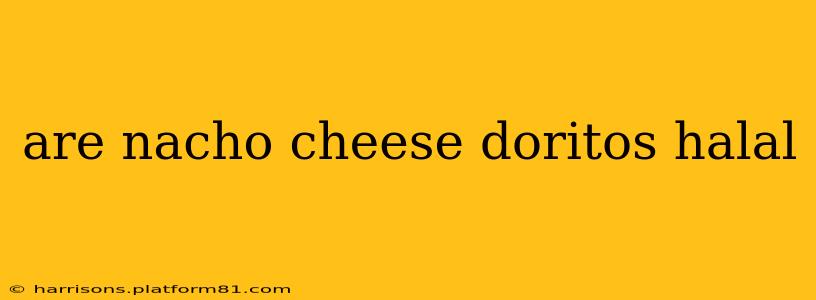Are Nacho Cheese Doritos Halal? A Comprehensive Guide
The question of whether Nacho Cheese Doritos are halal is a complex one, hinging on the interpretation of Islamic dietary laws and the specific ingredients used in their production. There isn't a simple yes or no answer, and it requires careful consideration of several factors. This guide will delve into the key aspects to help you make an informed decision.
Understanding Halal Certification
Before we address the specific case of Nacho Cheese Doritos, let's clarify what halal certification entails. Halal certification is a process where a product undergoes rigorous scrutiny to ensure it adheres to Islamic dietary guidelines (Sharia law). This usually involves verifying that the ingredients are permissible (halal) and that the manufacturing process is free from contamination with haram (forbidden) substances. The absence of halal certification doesn't automatically mean a product is haram, but it does indicate a lack of independent verification.
Key Ingredients and Potential Issues
Nacho Cheese Doritos, like many processed foods, contain a variety of ingredients. The potential issues regarding halal compliance often stem from:
- Animal-Derived Enzymes: Many processed foods, including snack chips, utilize enzymes in their production. These enzymes can be derived from animal sources (like pork or beef), rendering the product non-halal for strict observers. Manufacturers often don't explicitly list the source of these enzymes on the packaging.
- Additives and Flavorings: Some additives and flavorings might contain alcohol or other ingredients considered haram. Again, the precise source and composition of these ingredients might not be fully disclosed.
- Cross-Contamination: Even if the primary ingredients are halal, there's a risk of cross-contamination during manufacturing if the same equipment is used for both halal and haram products.
Where to Find Information
To determine the halal status of a specific batch of Nacho Cheese Doritos, consider these steps:
- Check the Packaging: Examine the packaging carefully for any halal certification logos from reputable Islamic organizations. The presence of such a logo would strongly suggest halal compliance.
- Contact the Manufacturer: Reach out to the manufacturer (Frito-Lay) directly through their customer service channels. They may be able to provide details about the ingredients and manufacturing process.
- Consult a Religious Scholar: If you are unsure, seek guidance from a knowledgeable Islamic scholar or religious authority in your community for a definitive interpretation based on your personal beliefs and practices.
Frequently Asked Questions
Are Doritos generally considered halal?
The halal status of Doritos varies depending on the specific flavor and regional production. Some flavors may receive halal certification in certain regions, while others may not. Always check the packaging and consult additional resources as mentioned above.
What is the difference between halal and haram?
Halal refers to permissible foods and practices according to Islamic law, while haram refers to forbidden foods and practices. The distinction is crucial for Muslims observing Islamic dietary guidelines.
Does the absence of a halal logo mean the product is haram?
No, the absence of a halal logo doesn't automatically mean a product is haram. It simply means that the product hasn't undergone independent halal certification. It's advisable to conduct further research or seek guidance as outlined above.
Are there halal alternatives to Nacho Cheese Doritos?
Several companies produce halal-certified snack chips and other similar products. These can be found in stores specializing in halal foods or online retailers.
Ultimately, determining whether Nacho Cheese Doritos are halal requires diligent research and careful consideration of the factors mentioned above. The responsibility for making this determination rests with the individual consumer based on their personal interpretation of Islamic dietary guidelines.
